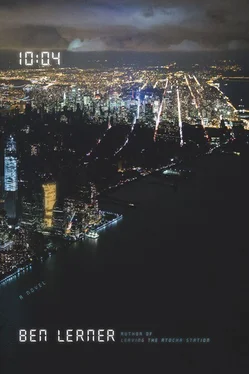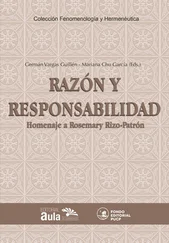I said that I had.
“I have a friend who was really wronged by his older brother but had never confronted him about it. The details don’t matter. But one day he got the courage to do it, to confront him on the phone. He’d been building up the courage for years. And he called his brother up and he said: I just want you to listen. I don’t want you to say a word, just listen. And his brother said okay. And my friend said what it had taken him such a long time to say, was walking back and forth in his apartment and saying what had to be said, tears streaming down his face. But then when he finished talking, only when he finished talking, he realized his brother wasn’t there, that the call had been lost. He called his brother back in a panic and he said, How much of that did you hear? and his brother said: I heard you say you wanted me to listen and then we got disconnected. And my friend for whatever reason just couldn’t do it again, couldn’t repeat what he had said. My friend told me this and told me that now he felt even more confused, more alone, because he’d had this intense experience of finally confronting his brother, and that experience changed him a little, was a major event in his life, but it never really happened: he never did confront his brother because of patchy cell phone service. It happened but it didn’t happen. It’s not nothing but it never occurred. Do you know what I mean? That’s kind of what it felt like,” Noor said, “except instead of a phone call it was my whole life up until that point that had happened but never occurred.”
Although I felt Noor had been speaking for hours, only forty-five minutes of our shift had passed. As we bagged the last of the mangoes, someone came from checkout and asked if anybody had ever worked at the register; one of the cashiers had had to go home early and they needed another person. Noor said she had done checkout before and discarded her gloves and bandanna and apron and, after smiling goodbye to me, went upstairs. I spent the rest of the shift bagging dates and trying not to look at the clock.
When my shift was over I left the co-op, buying a couple of bags of mango first, and, since it was unseasonably warm, decided to take a long walk. I walked on Union Street through Park Slope and my neighborhood of Boerum Hill and through Cobble Hill and beyond the BQE until I reached Columbia Street, a walk of a couple miles. I turned right on Columbia — the water was on my left — and walked until it became Furman and then continued a mile or so until I could descend into Brooklyn Bridge Park, which, except for a few joggers and a homeless man collecting cans in a shopping cart, was empty. I found a bench and looked at the magnificent bridge’s necklace lights in the sky and reflected in the water and imagined a future surge crashing over the iron guardrail. I thought I could smell the light, syrupy scent of cottonwoods blooming prematurely, confused by a warmth too early in the year even to be described as a false spring, but that might have been a mild olfactory hallucination triggered by memory — or, I found myself thinking, a brain tumor. Across the water, a helicopter was lowering itself carefully onto the downtown heliport by South Street, a slow strobe on its tail.
I breathed in the night air that was or was not laced with anachronistic blossoms and felt the small thrill I always felt to a lesser or greater degree when I looked at Manhattan’s skyline and the innumerable illuminated windows and the liquid sapphire and ruby of traffic on the FDR Drive and the present absence of the towers. It was a thrill that only built space produced in me, never the natural world, and only when there was an incommensurability of scale — the human dimension of the windows tiny from such distance combining but not dissolving into the larger architecture of the skyline that was the expression, the material signature, of a collective person who didn’t yet exist, a still-uninhabited second person plural to whom all the arts, even in their most intimate registers, were nevertheless addressed. Only an urban experience of the sublime was available to me because only then was the greatness beyond calculation the intuition of community. Bundled debt, trace amounts of antidepressants in the municipal water, the vast arterial network of traffic, changing weather patterns of increasing severity — whenever I looked at lower Manhattan from Whitman’s side of the river I resolved to become one of the artists who momentarily made bad forms of collectivity figures of its possibility, a proprioceptive flicker in advance of the communal body. What I felt when I tried to take in the skyline — and instead was taken in by it — was a fullness indistinguishable from being emptied, my personality dissolving into a personhood so abstract that every atom belonging to me as good belonged to Noor, the fiction of the world rearranging itself around her. If there had been a way to say it without it sounding like presumptuous co-op nonsense, I would have wanted to tell her that discovering you are not identical with yourself even in the most disturbing and painful way still contains the glimmer, however refracted, of the world to come, where everything is the same but a little different because the past will be citable in all of its moments, including those that from our present present happened but never occurred. You might have seen me sitting there on the bench that midnight, my hair matted down from the bandanna, eating an irresponsible quantity of unsulfured mango, and having, as I projected myself into the future, a mild lacrimal event.
* * *
“It’s always a projection back into the past, the idea that there was a single moment when you decided to become a writer, or the idea that a writer is in a position to know how or why she became a writer, if it makes sense to think of it as a decision at all, but that’s why the question can be interesting, because it’s a way of asking a writer to write the fiction of her origins, of asking the poet to sing the song of the origins of song, which is one of the poet’s oldest tasks. The first poet in English whose name is known learned the art of song in a dream: Bede says that a god appeared to Caedmon and told him to sing ‘the beginning of created things.’ So while I assume I was asked to talk about how I became a writer with the idea that my experience might be of some practical use to the students here, I’m afraid I have nothing to offer in that regard. But I can tell you how, from my current vantage, I have constructed the fiction about the origins of my writing, such as it is.
“In the story I’ve been telling myself lately, I became a poet, or became interested in becoming a poet, on January twenty-eighth, 1986, at the age of seven. Like most Americans who were alive at that time, I have a clear memory of watching the space shuttle Challenger disintegrate seventy-three seconds into flight. There had been, as many of you probably know, unusual excitement about this mission because one of the seven crew members was a teacher named Christa McAuliffe. She was selected from I don’t know how many applicants to be the first teacher in space, also the first civilian, part of a program called the ‘Teacher in Space Project,’ which would be canceled a few years after her death. McAuliffe was selected in part to represent ‘ordinary Americans’ and so we ordinary Americans were particularly interested in this mission. Millions of schoolchildren were being taught curricula related to the program and were looking forward to the launch. My third-grade class wrote her letters expressing our pride and wishing her luck. I remember Mrs. Greiner trying to explain the word Godspeed .
“Can I ask you, by a show of hands, to indicate if you watched the Challenger disaster live? Right. The majority of Americans who are over thirty years old today remember watching the shuttle crumble on live TV. It’s consistently noted as the dawning of our era of live disasters and simulcast wars: O. J. Simpson fleeing in the white Bronco, the towers collapsing, etc., although there had of course been other televised traumas before. I don’t have a single friend who doesn’t remember watching it as it happened — not as a replay later when you knew the shuttle was doomed, but when you expected the shuttle to disappear successfully into space and instead saw it engulfed in a giant fireball, saw the branching plumes of smoke as its components fell back to earth. I remember a moment of incomprehension, trying to imagine that what I’d witnessed was part of the plan, some kind of timed separation of one part of the shuttle from the other, and then, with a terrible sinking feeling, realizing, even as a seven-year-old, that that wasn’t possible.
Читать дальше










